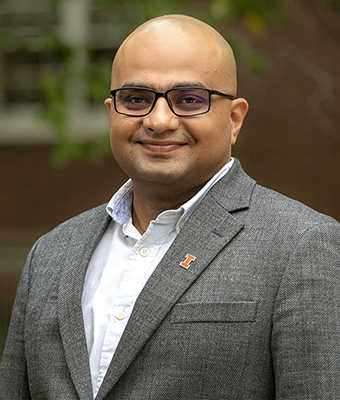
Jun 13, 2025 Business Administration Faculty Research in Education
UN Human Development Report cites Gies research on collective intelligence

Gies College of Business professor Pranav Gupta's groundbreaking work is changing the way the world thinks about AI and its role in human development. Gupta, an assistant professor of business administration, studies how people and technology can work together more intelligently: a field called "collective intelligence." Three of his recent research articles are cited in the 2025 United Nations Human Development Report, which calls for a new vision of AI-augmented human flourishing, rooted in collaboration, intentional innovation, and investment in people's capabilities.
“This UN report highlights the tectonic shift that is already happening on the developmental trajectory of our society across the globe,” said Gupta. “Given that humans are social animals, this technological phase shift we are experiencing is an exciting time to be in! We are at the brink of birthing artificial agents that can be social in ways no tool has ever been. Understanding how humans and AI collaborate at scale is of paramount importance. This goes beyond being a mere technological question to a question of what we value as humans. So, do we want to have AI locked in a master-servant relationship, or is it capable of building a collaborative relationship that enhances all parties involved?”
They advocate for an interdisciplinary approach that connects research insights across multiple disciplines to unlock the real potential of people and technology working together. In expanding the Transactive Systems Model of Collective Intelligence, Gupta and colleagues explore how memory, attention, and reasoning enable groups to adapt, solve problems, and sustain intelligence over time.
Gupta and colleagues' research moves beyond theory to measurement, diagnosis, and application. Studies show that collective intelligence, measured across hundreds of groups, strongly predicts group performance and is "more strongly predicted by group collaboration process than by individual skill." Their findings highlight that diverse, socially perceptive groups engaged in specific patterns of collaboration outperform others, offering a blueprint for designing more effective teams.
The UN's 2025 Human Development Report offers a future in which AI is not a substitute for human agency, but a partner in expanding it. By spotlighting work from a small but growing group of interdisciplinary researchers like Gupta, the report recognizes that harnessing collective intelligence across both human and machine domains is essential for advancing human development.
“As I see it, it is the question about who do we want our kids to become,” said Gupta. “Kids who grew up during war adapted to what it takes to succeed in a society at war; those who grew up with the internet adapted to what it takes to win the internet. The next few generations will grow up with AI agents - do we want them to excel in being subservient consumers or collaborative and collectively intelligent?”
How society answers that question, Gupta argues, will shape not only the next wave of technology but how we live, learn, and collaborate for generations to come.
